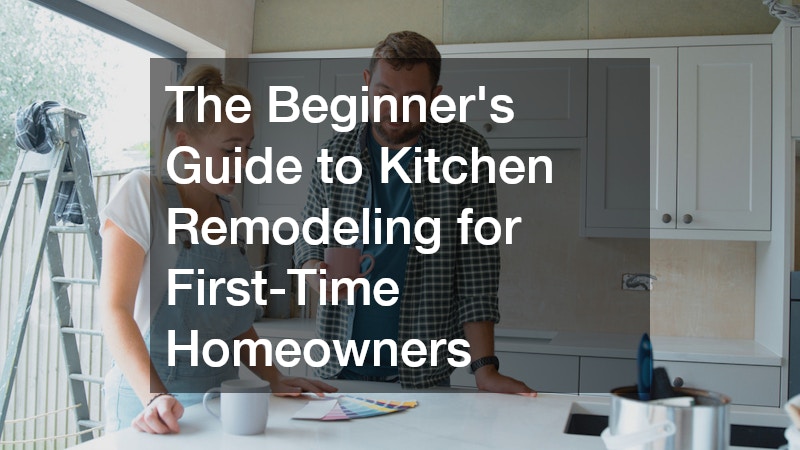
Buying a starter home is an exciting milestone, but it comes with its own set of responsibilities. Before the finalization of the residential moving process, it’s imperative to ensure the property is in excellent condition. That means conducting a series of thorough inspections to avoid potential problems down the line. Each inspection covers a significant aspect of the home and can save you both time and money.

Foundation Inspection
A foundation inspection is vital as it establishes the structural integrity of the home. If the foundation has cracks or other issues, it can significantly affect the value of the property. Before asking, “How much is my house worth?” you need to confirm its foundational stability.
Specialized inspectors check for visible cracks, sinking, or other signs of deterioration. They might use advanced equipment to gauge the depth and severity of any issues found. These inspections are essential either when buying a home or checking whether it’s time for reparations.
If problems are found, the cost of foundation repair can be substantial. That makes it crucial to factor this into your decision-making about buying the home. Investing in a good foundation inspection helps ensure you are making a sound investment.
Roof Inspection
The roof is one of the most critical components of any house. Roofing contractors should inspect it thoroughly for leaks, damaged shingles, and structural issues before buying a starter home. A well-maintained roof is crucial for keeping the elements out and maintaining the home’s overall condition.
During a roof inspection, experts look for signs of water damage, mold, and wear and tear. They also evaluate the lifespan of the roof and whether it needs immediate repairs or a full replacement. Such detailed inspection help you make informed decisions and negotiate better terms with the seller.
Even minor issues discovered during an inspection can be addressed quickly to avoid more severe damage. Hence, making sure your new home passes the roofing inspection can save you from future expenses and stress.
Electrical System Inspection
Electrical system inspections ensure your home adheres to safety standards and functions efficiently. This type of inspection can identify overloaded circuits and faulty wiring that might otherwise lead to hazards. A fire inspection is also an integral part of the evaluation, especially in older homes.
Inspectors will check the electrical panel, outlets, wiring, and fixtures to ensure they meet current codes. This meticulous approach helps avoid fire risks and reduces energy inefficiencies. Problems detected in this phase can be negotiated with the seller for repairs or cost reductions.
Testing the functionality of switches, outlets, and appliances ensures everything is in working order. Being diligent in this area can prevent future fire hazards and electrical failures. Thus, proper electrical inspection is essential for a safe and sound property when buying a starter home.

Plumbing System Inspection
Plumbing system inspections involve a thorough examination of the home’s water supply and drainage systems. Licensed plumbers conduct this type of inspection to spot leaks, water pressure issues, and potential pipe damage. Early identification of such problems can save you from costly repairs.
Inspectors check both visible and hidden areas of the plumbing system. They examine sinks, showers, bathtubs, and toilets for leaks and proper drainage. This comprehensive inspection aims to prevent water damage and ensure the reliability of the plumbing system.
A plumbing issue can quickly escalate into a significant problem if not addressed promptly. Therefore, getting a professional evaluation helps protect your investment. Proper plumbing inspection is another crucial step in safeguarding your new home.
HVAC System Inspection
Heating, ventilation, and air conditioning (HVAC) systems are integral to maintaining a comfortable living environment. During an HVAC inspection buying a starter home, experts check for functionality, efficiency, and potential issues. This kind of evaluation is essential for ensuring the health and longevity of your home’s heating and cooling systems.
Inspectors test the performance of furnaces, air conditioners, and ventilation systems. They also evaluate the air quality and make sure there are no leaks or defects in the ductwork. Such thorough inspections help identify problems that could escalate if left untreated.
The cost of repairing or replacing HVAC systems can be quite high. Hence, ensuring the system is in good working condition before finalizing the sale is critical. Thorough HVAC inspections offer peace of mind and ensure a comfortable living space in your new home.
Termite and Pest Inspection
Termites and pests can cause severe damage to a home’s structural integrity and overall condition. A professional termite and pest inspection can identify infestations before they become problematic. This type of inspection should be a priority for any potential homebuyer.
Experts conduct a detailed examination of the home, focusing on wooden structures and hidden areas. They check for signs of termite activity, pest droppings, and other indicators of infestations. Ignoring this crucial step can lead to significant structural damage and costly repairs when buying a starter home.
Identifying and addressing pest issues early can save you from future headaches. Some home insurance plans may even require a clear pest inspection before offering coverage. Thus, ensuring that your new home is free from termites and pests is a wise precautionary measure.

Radon and Mold Inspection
Radon and mold inspections are vital for maintaining a safe and healthy living environment. High levels of radon can be a serious health hazard, while black mold can cause respiratory issues. Inspectors use specialized equipment to measure radon levels and identify mold presence.
These inspections often go hand in hand with evaluating other potential environmental threats like asbestos. Hiring an asbestos inspector can also provide peace of mind regarding the home’s safety. Ensuring that your new home is free from these hazards is crucial for long-term health and safety.
Regular black mold inspection services can help identify and mitigate these risks before they become serious problems. Addressing these issues early on can prevent long-term health problems and ensure a safer home environment. Thus, this kind of inspection is essential for the well-being of your family.
Sewer Line Inspection
A sewer line inspection is critical to ensure the proper functioning of your home’s drainage and waste systems. Professionals perform a sewer camera inspection to identify blockages, cracks, and other malfunctions. Addressing these issues early can prevent severe and costly damages down the line.
This type of inspection involves inserting a specialized camera into the sewer lines to provide a clear view of their condition. It helps in spotting root intrusions, pipe misalignments, and other potential problems. Preventative maintenance, like this, ensures that the sewer system operates smoothly and efficiently.
Any issues found during the sewer camera inspection can usually be negotiated with the seller for repairs. Considering the importance of a functioning sewer system, this inspection is indispensable. Regular checks and maintenance help to keep everything running smoothly and prevent future problems when buying a starter home.
Insulation and Ventilation Inspection
Proper insulation and ventilation are essential for maintaining energy efficiency and indoor air quality. Inspectors check the home for adequate insulation in walls, attics, and basements. They also ensure that the ventilation systems are functioning correctly to provide a healthy living environment.
Inadequate insulation can lead to higher energy bills and an uncomfortable living space. Ventilation issues can reduce indoor air quality and increase moisture levels, leading to mold growth. Inspection in these areas helps identify problems that can affect the home’s efficiency and health.
Professional inspectors provide recommendations for improvements that can significantly enhance your home’s performance. Addressing these issues early on can save you from future inefficiencies and discomfort. Hence, ensuring your home’s insulation and ventilation are up to standard is critical.

Septic Inspection
If your home relies on a septic system, a thorough septic inspection is necessary when buying a starter home. Septic maintenance is crucial to prevent issues like backups, leaks, and system failures. Inspectors evaluate the tank, distribution box, and drain field to ensure they are in good condition.
Regular inspection and maintenance can extend the lifespan of your septic system. Professionals check for system functionality, leaks, and blockages. They also provide advice on maintaining and properly using your septic system to avoid future problems.
A failed septic system can lead to costly repairs and potential health hazards. Therefore, ensuring that your septic system passes inspection before buying a home is a wise decision. Taking this step safeguards your investment and ensures a properly functioning waste disposal system.
Appliance and Fixture Inspection
Inspecting the home’s appliances and fixtures is essential to ensure they are in good working condition. Experts evaluate kitchen appliances, water heaters, and other built-in fixtures for functionality. This inspection helps ensure that these components are reliable and won’t need immediate replacement.
Proper inspection of appliances like ovens, dishwashers, and refrigerators ensures they meet safety standards. It also identifies any potential issues that could become more severe over time. Having functioning and safe appliances is crucial for a comfortable and convenient living environment.
Inspectors also check for wear and tear on faucets, knobs, and other fixtures when buying a starter home. Addressing these small issues can improve the home’s overall condition and reduce future maintenance costs. Thus, a thorough appliance and fixture inspection is a necessary step in the home-buying process.
Chimney Inspection
When buying a starter home, it’s important to have a thorough chimney inspection to ensure both safety and functionality. Many potential homeowners overlook this crucial part of the inspection process, focusing instead on more visible aspects like the roof or foundation. However, a neglected chimney can lead to serious safety hazards and costly repairs down the road.
A professional chimney inspector will assess the chimney’s structural integrity, checking for cracks, loose bricks, or deterioration. They will also look for blockages, such as debris or animal nests, which can obstruct proper ventilation. One of the most dangerous risks associated with a chimney is creosote buildup, a highly flammable substance that can accumulate inside the flue. If not addressed, creosote increases the risk of chimney fires and carbon monoxide leaks, putting your home and family in danger.
Additionally, the inspection will confirm whether the chimney meets local safety codes, ensuring that it operates efficiently. If the home uses a fireplace or wood stove, a chimney in poor condition can lead to smoke backdrafts, inadequate heating, or inefficient energy use. Ultimately, a chimney inspection is a small investment that can save you significant costs in repairs and prevent safety risks, giving you peace of mind as a new homeowner.

Windows and Doors Inspection
When buying a starter home, a windows and doors inspection is a crucial step that should not be overlooked. Windows and doors play an essential role in a home’s energy efficiency, security, and overall comfort. Having them inspected ensures you won’t face unexpected repairs or high energy bills after closing on the house.
A professional inspector will evaluate the condition of the window frames, glass, and seals. They will look for signs of deterioration such as rot, warping, or cracks, which can lead to air leaks. Poorly sealed or damaged windows can cause drafts, making it harder to regulate indoor temperatures, increasing energy costs, and reducing the home’s energy efficiency. They also check for condensation between double-pane windows, which indicates that the seal has failed and the window will need to be replaced.
Similarly, door inspections ensure that both exterior and interior doors are in good working condition. Inspectors will look for misaligned doors, faulty locks, or gaps around the edges, which can compromise security and insulation. A door that doesn’t close or latch properly can also be a safety hazard. By getting a windows and doors inspection before buying, you can avoid costly repairs and ensure your home is energy-efficient, secure, and comfortable.
Buying a starter home involves more than finding the perfect neighborhood or exterior appeal. Ensuring your new home passes various inspections can save you from future headaches and expenses. Each type of inspection serves a crucial role in maintaining the home’s safety, functionality, and value. Schedule these inspections with professionals before you sign anything or buy your home officially!



